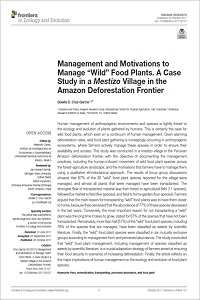Management and Motivations to Manage “Wild” Food Plants. A Case Study in a Mestizo Village in the Amazon Deforestation Frontier
Human management of anthropogenic environments and species is tightly linked to the ecology and evolution of plants gathered by humans. This is certainly the case for wild food plants, which exist on a continuum of human management. Given alarming deforestation rates, wild food plant gathering is increasingly occurring in anthropogenic ecosystems, where farmers actively manage these species in order to ensure their availability and access. This study was conducted in a mestizo village in the Peruvian Amazon deforestation frontier, with the objective of documenting the management practices, including the human-induced movement of wild food plant species across the forest-agriculture landscape, and the motivations that farmers have to manage them using a qualitative ethnobotanical approach. The results of focus group discussions showed that 67% of the 30 “wild” food plant species reported for the village were managed, and almost all plants that were managed have been transplanted. The strongest flow of transplanted material was from forest to agricultural field (11 species), followed by market to field (five species), and field to home garden (four species). Farmers argued that the main reason for transplanting “wild” food plants was to have them closer to home, because they perceived that the abundance of 77% of these species decreased in the last years. Conversely, the most important reason for not transplanting a “wild” plant was the long time it takes to grow, stated for 67% of the species that have not been transplanted. Remarkably, more than half (57%) of the “wild” food plant species, including 76% of the species that are managed, have been classified as weeds by scientific literature. Finally, the “wild” food plant species were classified in six mutually exclusive groups according to management form and perceived abundance. The study concluded that “wild” food plant management, including management of species classified as weeds by scientific literature, is a crucial adaptation strategy of farmers aimed at ensuring their food security in scenarios of increasing deforestation. Finally, the article reflects on the major implications of human management on the ecology and evolution of food plant species.

